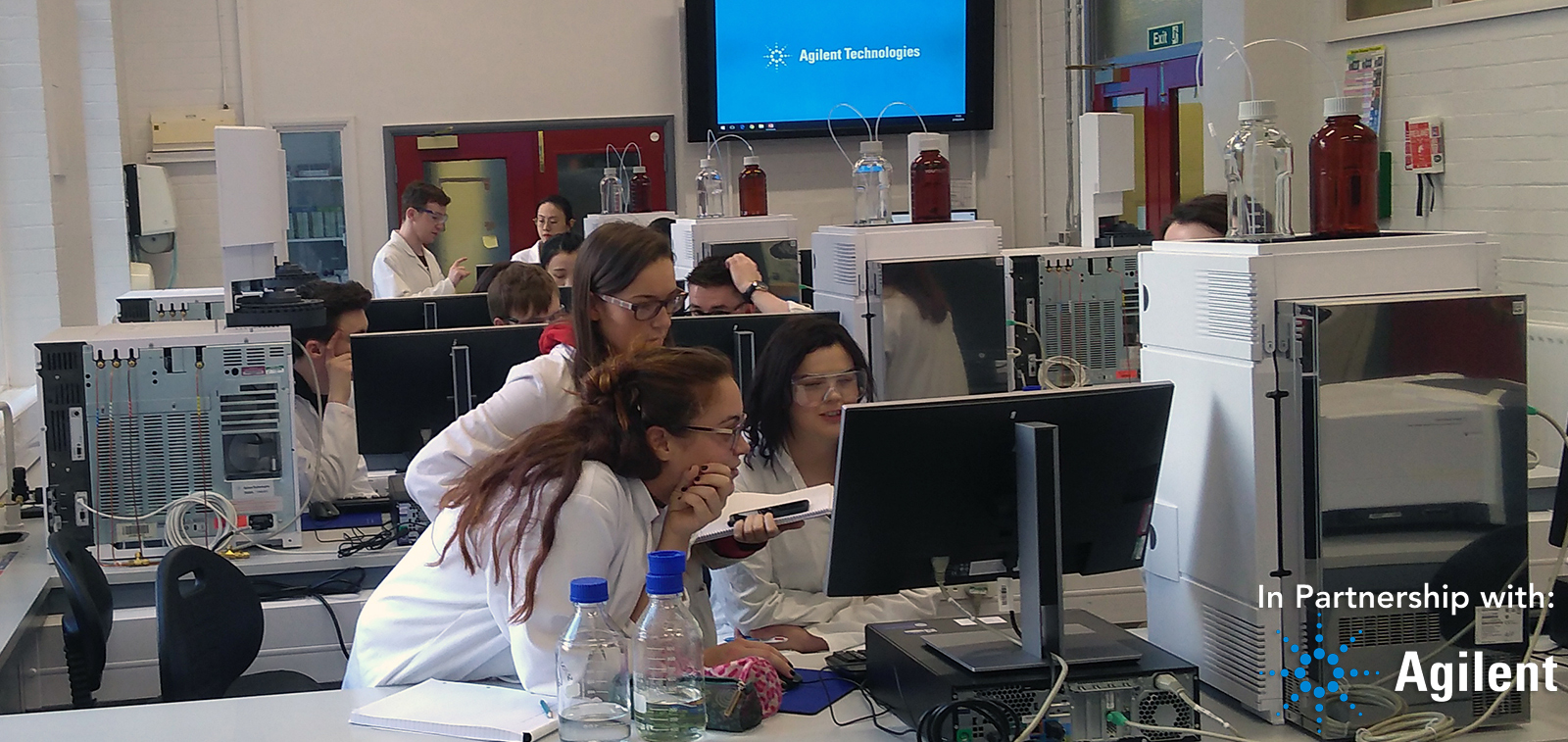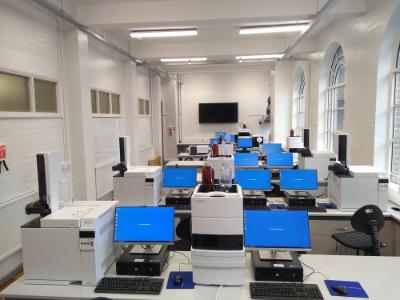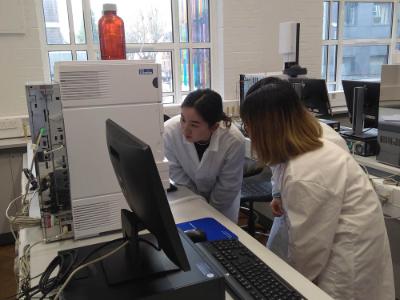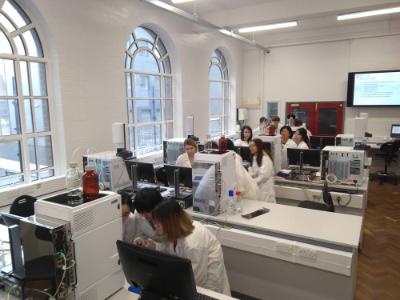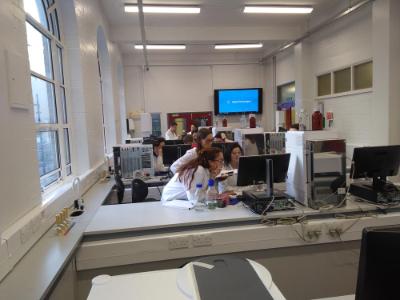MSc in Pharmaceutical Analysis
Aims and Objectives
The overall aim of the Master of Science in Pharmaceutical Analysis programme is to provide advanced training in chemical analysis, with a focus on applications in the pharmaceutical sector, providing students with an appropriate skill-set, knowledgebase and practical experience in preparation for a career either in industrial or academic chemical analysis research in a supportive learning environment.
To maximise student hands-on experience, in 2018 we formed a strategic partnership with Agilent Technologies, a globally leading instrument manufacturer, to equip our brand new labs and participate in the develivery of the course, with expert training on instrumentation, troublshooting and latest trends in analytical science.
The aims and objectives are to:
- prepare the student to move directly into graduate level employment in the chemical / pharmaceutical industry, or in a non-chemistry related industry;
- enhance their employability skills including the ability to work in a team, written and oral presentation skills, numeracy and preparation for self-motivated lifelong learning, professional development and service to society;
- gain appropriate knowledge and subject specific practical skills to permit students to progress to either an academic research degree (PhD) or an industrial research position;
- provide a practical research training through successful completion of a substantial piece of research in pharmaceutical analysis;
- undertake research at the forefront of the analytical sciences at an advanced level.
Programme Overview
The programme is designed to train students in the appropriate skills for them to be able to pursue a career in chemical analysis, either in an academic or industrial context, with particular focus on pharmaceutical analysis. The course is structured in a way that will ensure hands-on experience with the majority of techniques and instrumentation used nowadays in modern analytical laboratories.
The course comprises 4 taught modules two of which will run during the entire academic year (Sept-May) and two semester long modules; the first running Sept-Jan and the second Feb-May.
Module 1 (Sept-Jan) will cover the most important separation techniques relevant to the Pharmaceutical Industry as well as method validation, stability of pharmaceutical compounds and sample preparation methods (20 CATS points). Module 2 (Sept-May) will cover the majority of modern spectroscopic techniques and their applications in pharmaceutical analysis as well as aspects of GMP and GLP (40 CATS points). Module 3 (Sept - May) will discuss a series of solid state characterisation techniques and their application in pharmaceutical analysis (40 CATS points). Module 4 (Feb-May) will cover Quality Control and Quality Assurance in the Pharmaceutical Industry (20 CATS points).
Lastly, during the summer semester (June-September) the students will undertake a research project supervised by an appropriate academic member of staff from either the School of Chemistry and Chemical Engineering or the School of Pharmacy, followed by a written dissertation and an oral presentation.
Course Structure
The course comprises 4 taught modules (2x20 CATS points and 2x40 CATS points, i.e. 120 CATS points overall) and a laboratory-based research project with dissertation which is equivalent to 3 taught modules (60 CATS points). The course therefore meets the QAA requirement of 180 CATS points for a Master's course.
Module Content
Module 1 - Advanced Separation Science
This module will provide an extensive overview of the design, workings and operating principles of a range of chromatographic instruments. Methodologies relating to the use of such analytical instruments in qualitative and quantitative analysis of pharmaceutical and related products will be extensively covered and specifically related to analytical aspects of Pharmacopoeia monographs.
Module 2 - Chemical, Biochemical and Spectroscopic Analytical Methods
This module will provide an extensive overview of the theoretical principles and the design and operating principles of a range of spectroscopic instruments. Methodologies relating to the use of such instruments in qualitative and quantitative analysis of pharmaceutical and related products will be extensively covered and specifically related to analytical aspects of Pharmacopoeia monographs. The module will cover the design, workings and operating principles of a range of analytical techniques that are commonly used to characterise the physicochemical properties of finished products, as defined in worldwide Pharmacopoeias.
Module 3 - Solid State Pharmaceutical Analysis Methods
This module will provide a comprehensive overview of the theoretical principles and the design, and operating principles of a range of instruments for the qualitative/quantitative analysis of the solid state, as related to pharmaceutical and related product design. These methods include thermal analytical techniques (differential scanning calorimetry, thermogravimetric analysis, thermomechanical analysis, isothermal calorimetry), x-ray crystallography, powder x-ray diffraction and solid state Nuclear Magnetic Resonance Spectroscopy.
Module 4 - Quality Assurance/Control in the Pharmaceutical Industry
This module will provide a comprehensive overview of quality control and quality assurance principles and processes that operate within Healthcare Industries. In addition the role of the QA/QC team within the industry framework will be detailed, including product manufacture and registration. The module will also provide a comprehensive overview of statistical methods that are employed within QA/QC.
Research Project
An essential part of the course is a laboratory-based research project with accompanying dissertation. This is equivalent to three module credits (60 CATs points) and must show evidence of a significant and original piece of research potentially leading to publishable results. The research project will provide training in how to tackle a research problem in chemistry and will include a strong emphasis on the development of critical thinking, analysis of data and independent research. Formally, work on the research project commences in June, and students are expected to submit their dissertation by the end of September. Students will be supervised for their project by an appropriate academic member of staff from either the School of Chemistry and Chemical Engineering or the School of Pharmacy.
Course Duration and Mode of Study
The course is offered on full-time and part-time basis, in order to accommodate students already in employment. The full-time course lasts one year and the part time course two years.

